#fiber processing
Explore tagged Tumblr posts
Note
Hey,
You always seem to have really good resources, so I hope you don't mind me asking.
I want to grow, then spin my own flax/linen. Do you have any advice or resources?
Thank you
Hello! Happy to build a reputation for resources, 😁✊
First: the modern linen "bible"...this book is well-written/sourced, and contains basiclly everything you ever wanted to know about the plant and the process:
Next, here's Cindy Connor running the whole process. She took a workshop and then jumped in all at once. 🥳
Cindy Connor is someone who walks the walk, a book author, and contributor to homesteading zines like mother earth news. I like her blog because it's great at getting into the nitty gritty of process and a bit of history, but also she improvises and doesn't let anything be too precious to hack.
Finally, here's Fiadnata's blog on the whole process, included specifically for their bibliography (she's soooooo good about this, do please click around the site for a treasury of practical and historical research on everything from bast fibers to building looms)
123 notes
·
View notes
Text
Raw fleece

Find the locks

Flick them open

Wrap them in netting to wash

Try not to injure yourself while combing

Pull off some nests

Spin it really fine

Make it a two ply

And then you can knit a ring shawl
(I am still on the spinning part, but that's the goal)
159 notes
·
View notes
Text

Definitely shoulda brought more fiber. 14 rolags ready for spinning on stream ! Gonna be the usual time (4ish hours from now/6 pm PST/1 am GMT). should be fun !


44 notes
·
View notes
Text




Can anyone help me identify this fiber?? I bought a couple pounds or so of it from the local craft supply thrift shop, but nobody there knew what it was more specifically than 'some kind of unwashed unprocessed fleece.'
It is incredibly soft, smooth, and silky. It has very little odor or oil/lanolin in it, and not that much dirt or plant matter either, so I'm processing and spinning it in the grease.
I'm amazed at how little the fleece is tangled or matted, given that the fibers are mind-bogglingly fine, and have a staple length of around 10 inches/25.4 cm. Like, holy shit these are crazy long fibers. By far the longest protein fibers I've ever spun. I'm seriously considering taking a break from spinning until I can make some kind of distaff to make this stuff more manageable.
It honestly feels like spinning flax, but like, if flax grew out of rabbits and felt like the finest softest bunny floof. Combing it is bizarre, because it goes from being locks densely clumped together, to being an open, airy cloud of fibers that seems almost to want to float away (as well as creating a lot of static and trying to cling to everything I'm wearing, but that could be more to do with it being 50 F/10 C in my room).
46 notes
·
View notes
Text
i really like seeing posts about how other people are processing their fibre, so i thought that i'd add ours. we bought a couple bags (about three kilos—this photo is only half) of raw fleece at sheep and wool, and now have it all washed out and cleaned up.
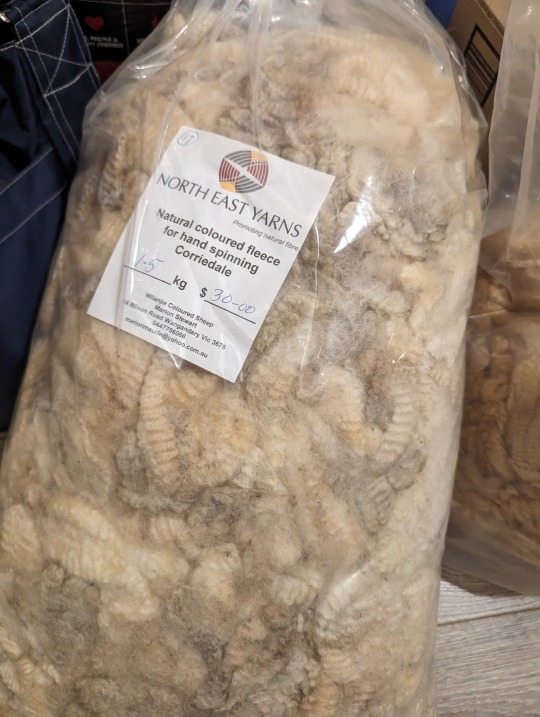

the most helpful boys in the world were very interested in what we were doing, and frankly far less suspicious of the large tub of water than i would've preferred for them to be.

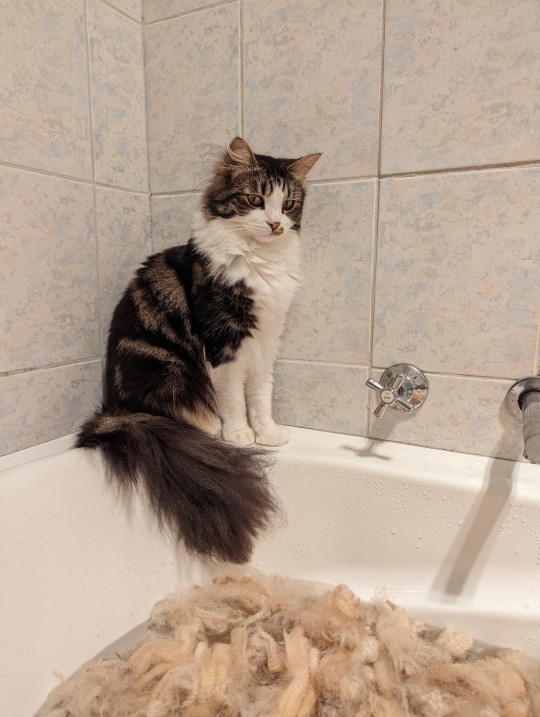

anyhow, about a kilo of fleece got dumped into the tub and arranged to be as aligned as possible. in future washes, i didn't bother with this and didn't find that there was much a difference, and certainly not sufficient difference to justify the time and effort spent carefully laying it out.
i imagine that this is different if you're washing a whole fleece and things are already more or less aligned. if you're washing a bag of of fleece that's just been plopped into the bag, i would suggest not bothering.
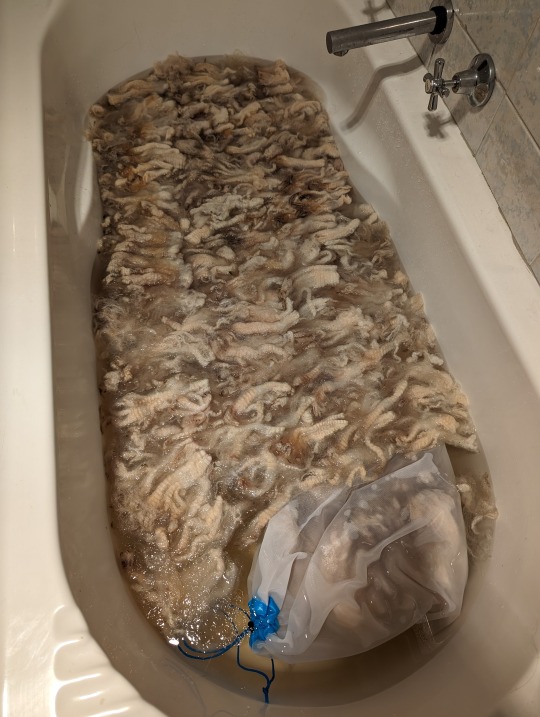
the small bag at the end were some locks that we'd picked ahead of time to see if they washed up nicer. (spoiler: they did not.)
worth noting is that we have one of those bathtubs that's short but deep, so this isn't as much water or space as it looks like.
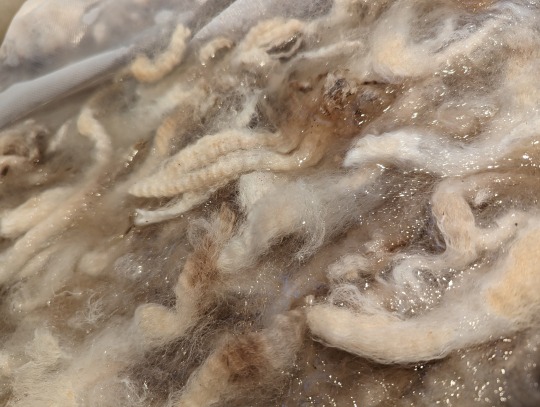
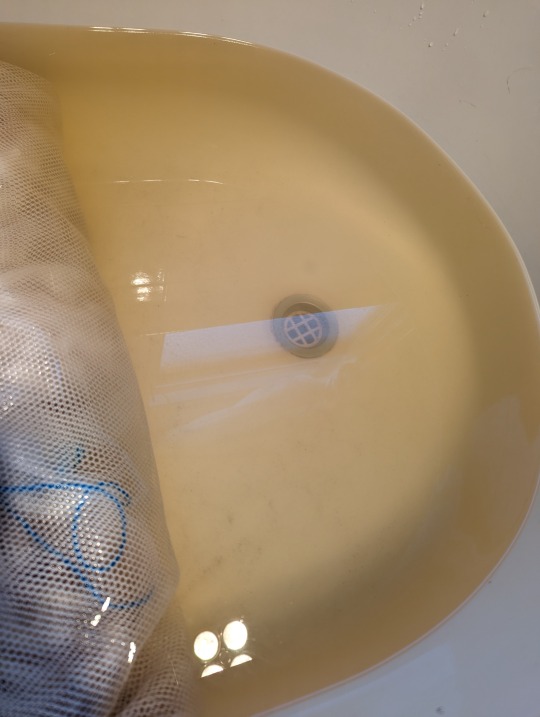
if you've ever wanted to see how water-resistant wool is, here's a great example. these photos were taken the next morning, and some of the fibre was still totally dry, despite having carefully pushed it all underwater before we headed to bed.
after about twelve hours of soaking, this is what we had—the water doesn't look that dirty in the second photo, but you can just barely see a cloud of dirt at the edge of the mesh bag we were using to hold the wool in place in the tub. (it was just laid on the bottom of the tub, and meant that we could easily move the wool up or down the tub, or lift it out entirely, without having to move it much.)
anyhow, soaking water from this batch went into a bucket to feed my wife's plants. (and then the next batch i fucked up and drained it. 🤡 it's amazing they put up with me, tbh.)
wool got moved safely away from the water, and then it was time for the hottest tap water we could manage. our tap runs at well over 60c/145f, so we didn't bother to try to make it any warmer. as it was, i was very grateful that we'd bought the extra heavy duty kitchen gloves.
we added a couple splurts of dishsoap (palmolive) to the tub, then carefully let the fleece spread itself out again, which doesn't take much encouragement, thankfully. and then we fucked off for a while.
twenty minutes later, the water looked like this.
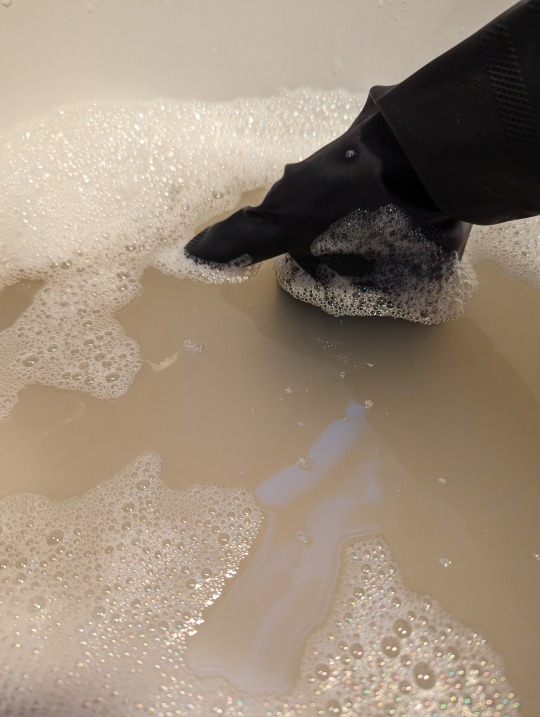
my hand's in the water to about my knuckles in that photo, and as you may notice, it very much appears that i have no fingers.
second wash. our friend the very large mesh laundry bag helped hold the fleece first away from the drain, and then from the tap, and we did it again just like the first wash.
another twenty minutes, and we had this.

you can almost believe that i've got fingers! progress!
this post offers a great look at what it looks like when lanolin is leaving a fleece. we have incredibly soft water, so most of their findings weren't especially relevant to our washing, but the visual guide is fantastic, especially since it took them so many changes to get things clean.
so again, drained, refilled, and resoaped, then left to sit for twenty minutes. and this time, i came back to this!
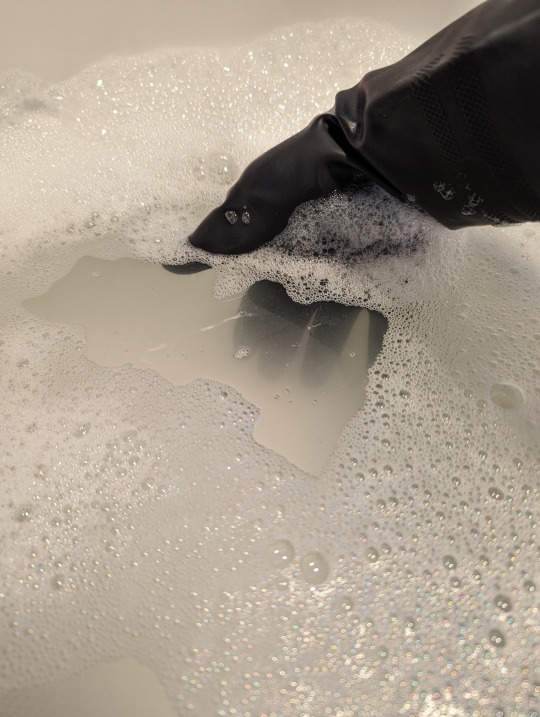
a whole entire hand! fingertips and everything! i was sort of surprised, honestly, since fine wools have a reputation for being really lanolin heavy, but after this batch of fleece i went down to two washes, and feel like it was more than sufficient for 90% of it. (there was a chunk of merino/bond cross in a later batch that was a little shorter and more lanolin heavy, and likely could've used a third wash, but i'm using that to make rolags and it's going fine, so whatever.)
anyhow, fleece clean! rinse time!
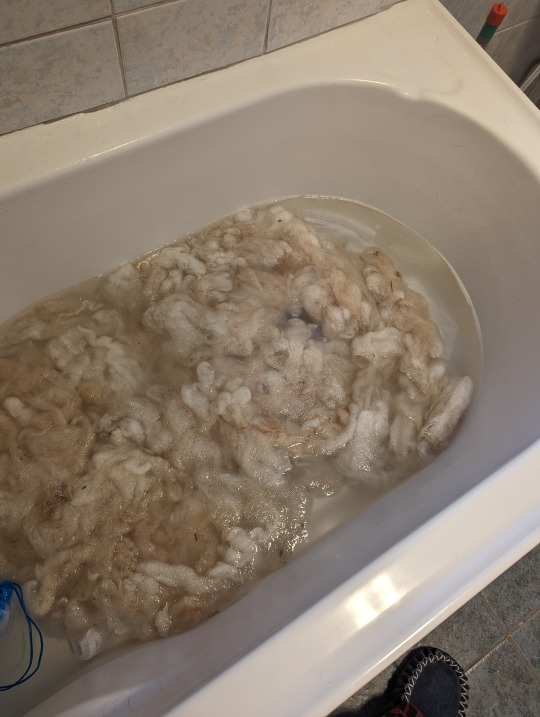
this looks like fleece in water, because that's what it is. we did two rinses, and that seemed plenty sufficient to get out all the suds.
next we spread it out as gently as possible onto a cheap sweater drying rack and hung it on a giant screw that's sort of inexplicably sticking sharp-end-out of the eaves of our porch. (and you'd be like 'that sounds normal, lots of people have screws or whatever to hang things,' to which i'd say 'it does! except that there are three of them and the placement is utterly bizarre, and this is the only one that you can hang anything from.' my best guess is christmas lights, but why a screw? why sharp side out? how sharp side out, at that?)
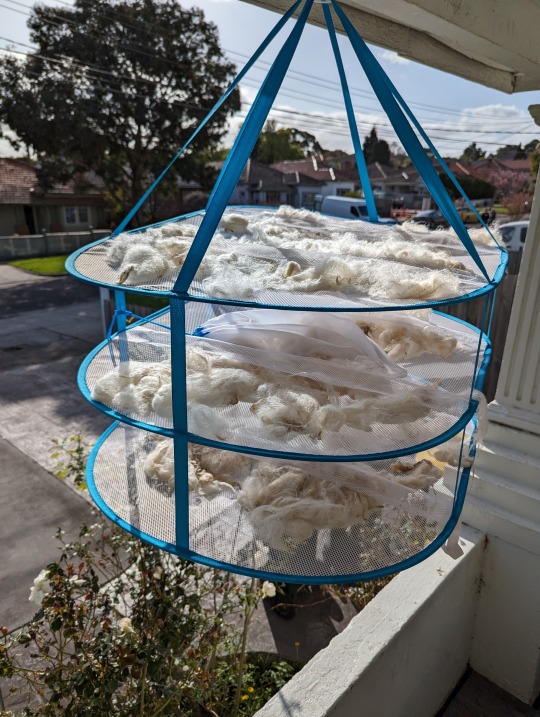
wool, drying! and the hated roses that have been blooming all fucking winter and are continuing to bloom and are getting bigger and now have spawned more roses somehow, and now we have a bunch of red roses, too. when we moved into this place a year and a half ago there were only white roses. we don't know where the red ones came from, nor do we know why the roses are suddenly VERY TALL—see how in this photo, they don't even clear the top of the wall? now they're like 50cm over it. eighteen inches over it. why. i hate them.
i will continue to hate them unless they become tall enough and self-support enough that they accidentally shade our office, in which case i will hate them slightly less but i'll be mad about it.

and now we're done! that's a lock of nice clean wool! all we did before this photo was fluff out the tips a bit.
i combed some out, and it's pretty good!
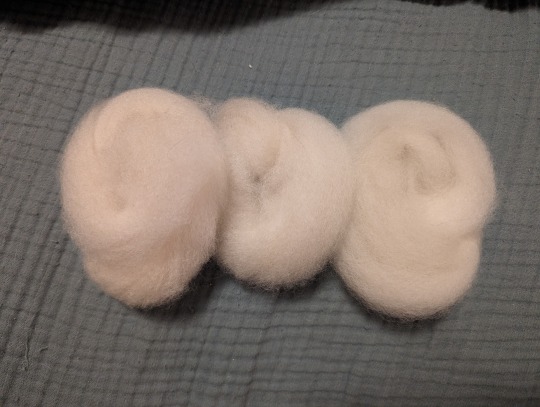
nice little nests of combed top. the wool's slightly different colours because, like i said, it wasn't a fleece, it was just fleece, if that makes sense, so there's a bit of a range of colouration in there. but there's much less loss than i'd expected, even combing it out, and all up this was a much easier and less miserable process than i'd feared it would be!
i've put off buying raw fleece for a long time, partly because i've mostly lived in apartments and haven't had a ton of space in which to wash it, and partly because i'm disabled and was afraid that doing it would be too much physically, but it turns out that i probably could have done this a lot sooner, and also that it's not really that hard on the body. the worst of it for me was bending over the tub to fill/refill and then get the wool onto the drying screen, which was a little rough, but definitely not so rough i wouldn't do it again.
(we then did this several more times to get all the fleece washed, and i can already tell you: we're gonna do it again.)
this is the first time i've done raw fleece that had lanolin in it, so please don't take this as an authoritative resource, but that's what we did, and it worked really well and was a lot easier than i'd feared, so i figured i'd share.
#spinning#handspinning#hand spinning#fibre processing#fiber processing#fibre prep#this was fantastic and i loved doing it#i'm very excited to see what we make with it#though i think a lot of this is going to be experiments with processing the washed fibre#but next year there will be even MORE fibre!!#i'm very excited
205 notes
·
View notes
Text
I swear I'm not dead, just overwhelmed 😅
Slowly fighting my way through the wool washing experiment to finish the article until fall (I try to miss the TdF as a motivator, but it's still going sooooo slow 😭)

29 notes
·
View notes
Text
cleaned, combed, spun, & wound into a ball a sample of some of the romney/corridale fleece I got over the weekend <3

#handspinning#fiber processing#fiber arts#despite owning combs for so long I've never spun hand combed top before. it was SO NICE#the spin turned out fluffier than expected though#letters from skylark
34 notes
·
View notes
Text


I’ve got a large basket of raw cotton that have been pulled from their blossoms.
Question: can I put them into a swinging wool picker to just separate them out a bit more and maybe from their seeds too? There’s a lot of dried leaf bits in them that I want to take out too, would the swinging wool picker help with that?
4 notes
·
View notes
Text
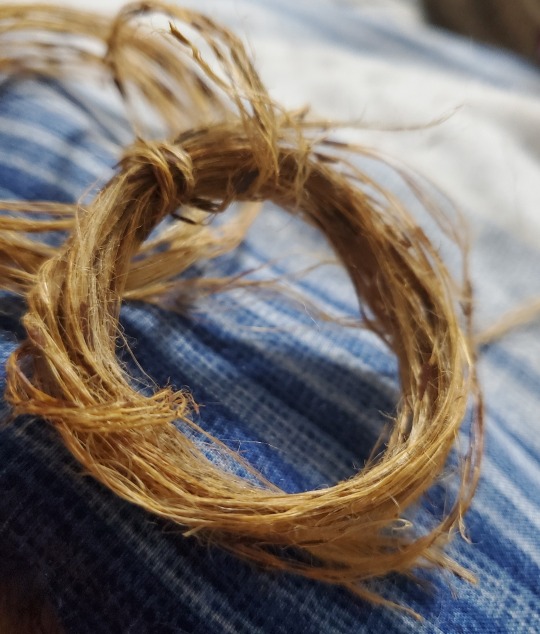
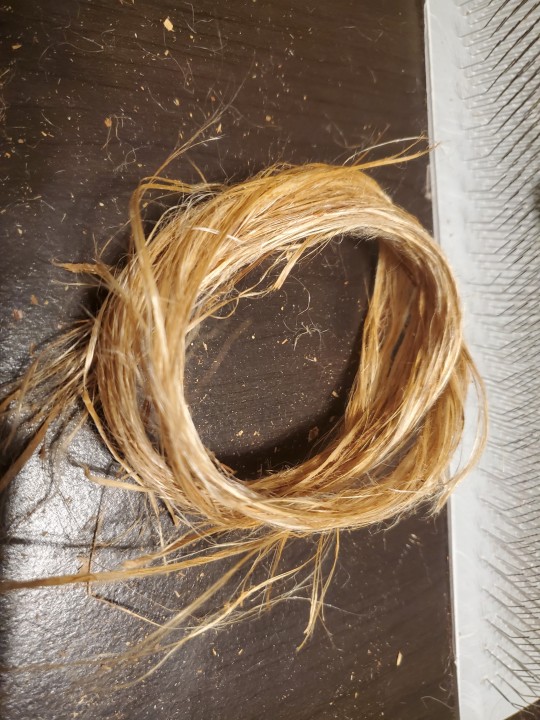





Different stages of dogbane processing. Experimenting how best to clean and separate the fibers without losing a bunch and breaking down all the long lengths. I haven't carded the most recent batch, but 1. Scraping off outer bark before splitting the fibers from the pith and 2. Cleaning them with a comb instead of going straight to cards seems to be helping. Although a big part tbh was just splitting the stalks cleanly with a knife instead of breaking apart by hand.
Insane how soft they are when carded well though--hard to find specific resources (there's some youtube on a lot of these bits but not as much for washing/post spinning processing) but wondering if it'll need boiled and beat the way flax does (from what I can tell nettle too).
Experimenting is fun but hate ruining stuff the further I get in processing. I have a good stock of stems foraged and know where to get more (although they're more at risk of being degraded this far in the season) but it does take a long time for a little. I'm having fun with it and doing small bits at a time due to caution and impatience lol but if I ever want to get as far as actually making something. I will need to actually make a lot lol.
#mostly posting to have my stuff organized somewhere. to the rest of you i am just playing with sticks#dogbane#fiber processing#idk how to tag so I'll be able to find it again lol#natural fibers#foraged fibers#foraging#bast fiber
4 notes
·
View notes
Text



Husband and I made this for a friend's birthday. I don't take up with the early fleece processing, but I knew my friend needed a picker.
Such a fun build. Still waiting to hear how well it works, but the spiky bits are.. very pointy.
Yup. Really proud of this.
4 notes
·
View notes
Text








Hand embroidered, self drafted, birch tree inspired buttonup shirt.
#will reblog with process#hand embroidery#embroidery#blackwork#blackwork embroidery#sewing#sewblr#self drafted#history bounding#birch trees#fiber arts#crafting#my post#finished project
13K notes
·
View notes
Text
Working on the second bobbin of my ring shawl spin

This is going to take some time, but I'm enjoying the process.
Fiber is British bowmont that I washed and combed. Spinning worsted and very fine

It's a good thing to keep my hands busy while I listen to a textbook.
57 notes
·
View notes
Text
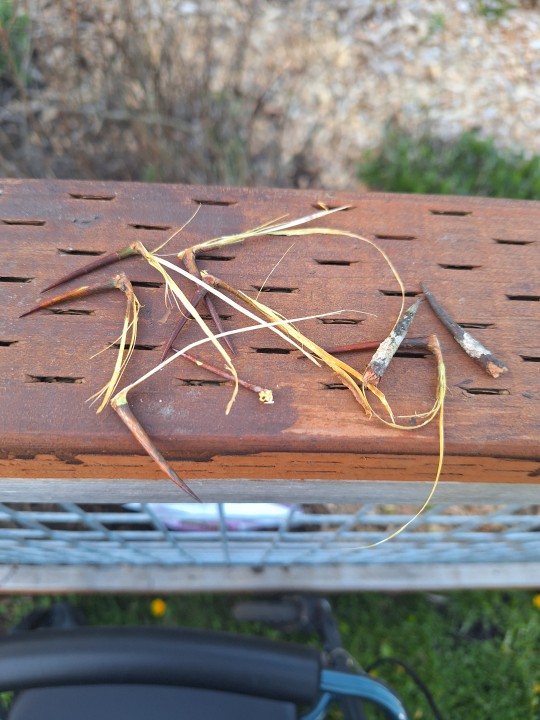
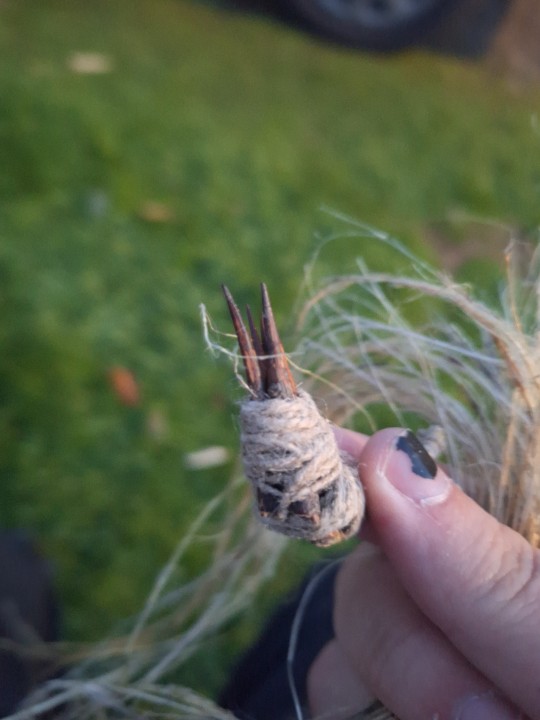
Proof of concept thorn tool. (Much better versions of) these are known throughout prehistory and were used to process plant fibers. I didn't know if they'd work well enough on milkweed to bother with, but now I have tried.
I probably need at least 30 thorns, and definitely longer ones. I was collecting and storing some in my rollator bag, and I think they might have been falling out because I definitely picked way more. But even like 7 or so very short ones bound together (badly) with flax was still, in fact, a far more effective tool than just my hands.
I only processed one milkweed stalk, since it was getting dark and this tool does absolutely suck, but I got it from whole rhetted stalk to fiber in about 10 minutes, and I think I could easily do 2 or 3 stalks at once and it would take the same.
I first smashed the stalk with a hammerstone against a wooden stump to get the hard pith out. The stone on wood technique is new to me but very effective. I'd been trying stone on stone (lack of available tree stumps to work on) and it hardly gets the pith out at all. But stone on wood is super effective as well, definitely will keep doing that.
After removing the pith I combed it repeatedly with the tool. This was made difficult by the fact that the tool was constantly wiggling around and falling apart. But it quickly stripped the outer layer off the fibers. Previously I had been rubbing them between my hands, which was very very slow and tended to damage the fibers. I got the idea from Sally Pointer's videos, but I think milkweed might just have too thin an outer layer ? Or some other reason (or maybe I was doing it wrong, but I don't see how as it is just rubbing). So the tool worked much better and faster. It did produce a lot of tow, although better technique and a better tool will probably help with that.
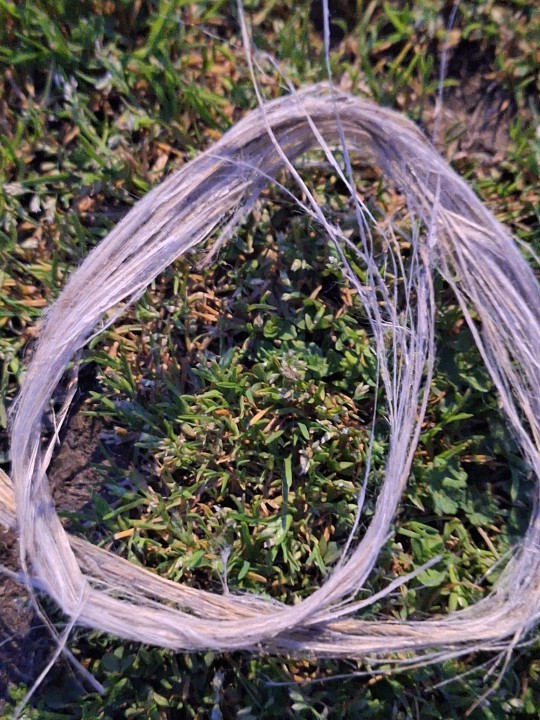
The line fibers

The tow fibers (top--I didn't have the energy to clean them up, but these should be spinnable as a rolag once I do)
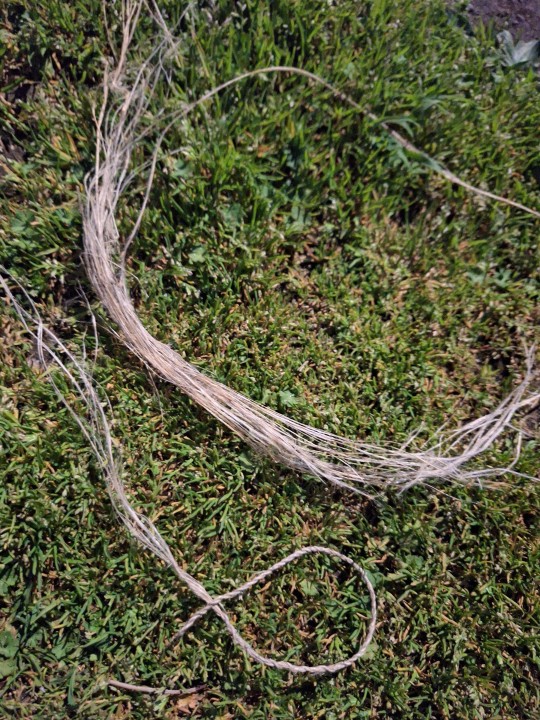

Also tried a little cordage. My twist ratio was way off, which is a new cordage problem for me. I was curious how it would work up, but I don't plan to continue it. Not sure what to do with the rest of the milkweed though. I'm not very confident about spinning it, although maybe if I processed it more I'd have a better chance. At the moment it feels very rigid...not like the flax or hemp I've used.
Anyway, I need to go back to the hawthorn trees I found in the winter and look for new thorns I guess, although it might be too early. I really want a better tool so I can process the mountain of milkweed stalks before I move.


#milkweed#fiber processing#sorry for the bad pictures it was night when i finished#prehistoric fashion#(thats just my prehistory tag but also if i can spin it it will be prehistoric fashion so)#bast fiber
237 notes
·
View notes
Text



First art of the new year is all about re-structuring your internal monologue.
In my early 20s I was working full time in London with many social commitments and a variety of hustles and side projects.
In my later mid 20s I cater to many sensory and social drain needs I have and indulge in special interests while respecting my lower energy reserves and celebrating my different way of processing the world.
Did I get more autistic? Nah. I got less fake.
-
[Art description: Three panels showing figures on a black background. Long descriptions follow.
1. A drawing of OP as a person with hip-length hair and a dress standing sadly with her hands clapsed together in front of her. She is coloured a muted rainbow gradient. Behind her, two pairs of nondescript figures chat while smiling. White text says, ‘I’m getting more and more autistic the older I get.’ 2. OP’s colours are brighter, and her expression looks happier. Crayon-like scribbles have crossed out the text from the previous panel. 3. OP’s colours are vibrant, and she balances on one leg and throws her arms out as she dances. The text above has changed to say, ‘I’m becoming more and more myself the older I get.’ \End descriptions]
#urchin art#autism#autistic#neurodivergent#neurodiversity#actually autistic#autistic things#autistic adult#autistic artist#autistic community#listen- the process of unmasking every fiber of your fabricated being is difficult#figuring out who you are behind the mask is scary#but continuing to act in a play where only you got no script is officially cringe#(this is me waxing poetic I am very aware of the safety needs of masking but that's not the point)#the point is ask yourself#are you getting MORE xyz?#Or are you becoming MORE of you?
7K notes
·
View notes
Text
victory is mine!

well, like 90% mine.
the bad parts are twofold. the first is that i was hoping that the licker in would lose some of the grey fleece that's all over it when i ran through some of the garbage compacted rambouillet with the bad dye job that i hate, and that didn't happen even a little. so tomorrow i'm going to be sitting out there with toothpicks, tweezers, and a toothbrush, pulling out all the old fleece.
the other thing is that carding this generated a fair bit of dusty rubble that i think is some of the rubber from the carding cloth. i'm not super worried about this. it doesn't seem to be catching in the wool at all, and the teeth are in great shape and pretty secure regardless. my handcards are pretty stiff (undesirably so) and these teeth have more play than those, but seem well seated. 🤞
the good news!
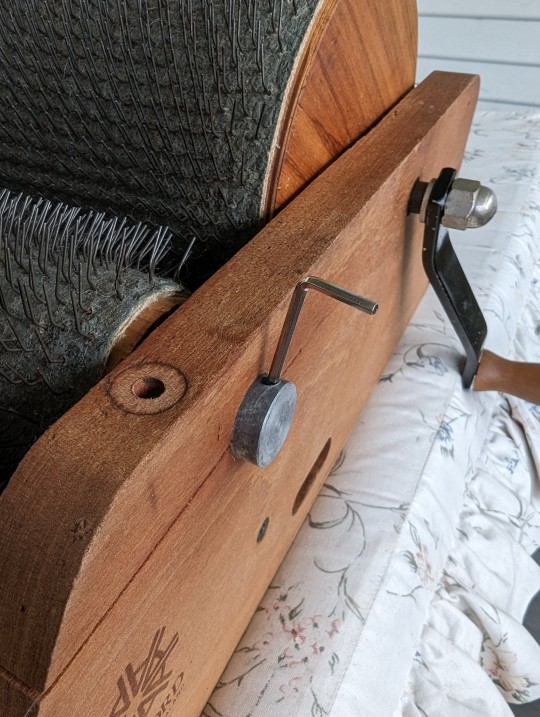
first, if you don't have the pin to adjust your tension, any one of the millions of small hex wrenches that have come with every piece of furniture you've ever bought will be fine.

second, that's a batt! weird light because the sun was nearly gone, and the carder is resting on my leg, but that's definitely a batt! it's actually a shockingly nice batt, so nice that it makes the terrible no-good very bad fibre... enjoyable?? not this bit of it, obviously, since it was mostly to see if things worked and remove old fleece from the larger drum (very effective), but if the drum had been clean, i absolutely would've spun this.
at some point i'm going to pull her back apart and give her a good coat of wood oil, and i obviously still have to clean the licker in, but all up, this was very successful and i feel good about it. the carder is about as old as i am--this model was ashford's first drum carder, so far as i can tell, and they only made it from 81 to 83--and it has clearly seen a lot of use. hopefully we'll get many years of use of it, too!
(obligatory photo of the sunset as i headed inside)
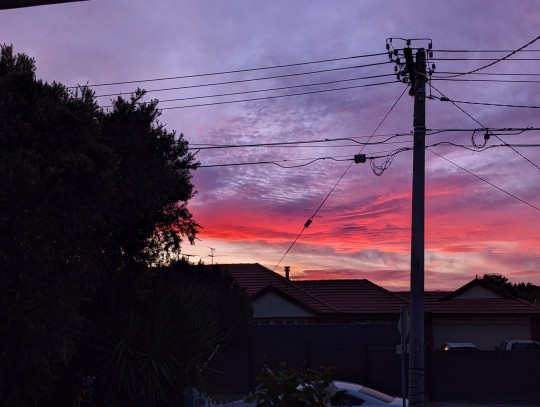
89 notes
·
View notes
Text




a collection of my favorite clip studio brushes that i shared on bsky a while back - i figured i'd share it here too! they are all FREE!! (or were last time i checked like 6 months ago)
#process#clip studio paint#csp#sowry for not posting much recently. i have life.#been doing a lot of fiber arts that are just 4 me ^__~
858 notes
·
View notes